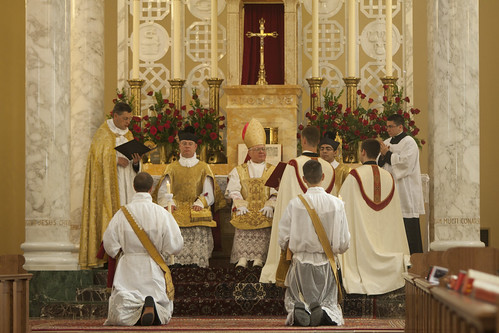
The Ratio fundamentalis institutionis sacerdotalis is one of those documents readers of this blog are extremely unlikely to have heard of, but it is important: it sets the ground-rules for seminary education. There have been two editions, issued by the Congregation for Catholic Education, in 1970 and in 1980.
We may think of it as a intermediate document between the Second Vatican Council's Decree on Priestly Training Optatem totius, and the more specific national guidelines for seminary education, which should be produced by each Episcopal Conference and submitted to Rome for approval, the Ratio studiorum. Also relevant of course, and of a higher level of authority, is Canon Law, which has some things to say about seminary education, although the new Code of Canon Law (1983) came out after the most recent edition of the Ratio fundamentalis. Another important document is Bl John Paul II's 'Post Synodal Exhortation' on Seminary education, Pastores dabo vobis, which dates from 1992.
The distressing state of many seminaries around the world is not unconnected with the failure of the theoretically rather strict system control the Holy See has over what seminaries teach. For one thing, it is rather surprising that, after refreshing the Ratio fundamentalis only ten years after the first edition, the Congregation for Catholic Education never produced another edition. There have been a few developments since 1980, not least the new Code of Canon Law. Now responsibility for seminaries has been transferred to the Congregation for Clergy, and we may wonder if they will do a new edition. If they do, no doubt it will take some time to prepare.
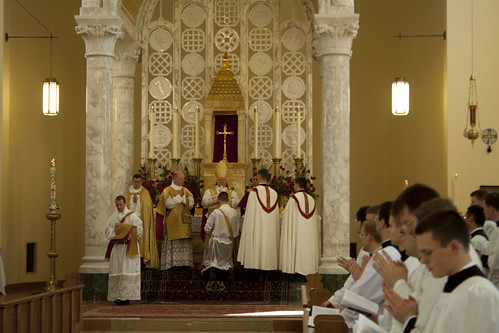
In addition, it appears that the Bishops' Conference of England and Wales have never proposed a Ratio studiorum for their seminaries. The obligation to produce one and get it approved is spelled out in the Code of Canon Law (Canon 242), so to say that this is pretty surprising is an understatement. The process of checks and balances between the bishops and Rome is simply not functioning.
For what they are worth, let's see what these documents say about the teaching of Latin.
Optatem totius 13: Seminarians 'are to acquire a knowledge of Latin which will enable them to understand and make use of the sources of so many sciences and of the documents of the Church.'
Ratio fundamentalis (1970): 66. 'On the completion of these studies, any deficiency in knowledge which is required in a priest must be made good either before or during the study of philosophy, as n. 60 indicates. An example would be that reasonable proficiency in Latin, which the Church continually and insistently demands. A list and program of these studies should be included in the Scheme for Priestly Training.'
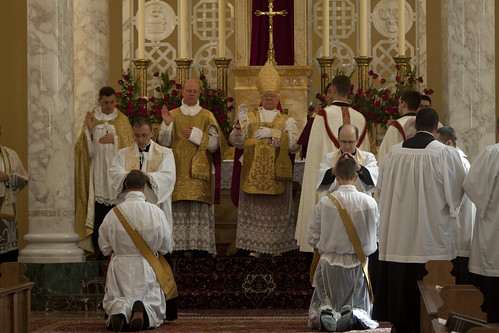
Ratio fundamentatlis (1980): 'It has been abundantly proved that the general orientations of the Council, if they are faithfully observed, do not irritate the People of God. They rebel only against novelties and excesses. For instance, the Council is far from having banned the use of the Latin language. Indeed, it did the contrary. Thus the systematic exclusion of Latin is an abuse no less to be condemned than the systematic desire of some people to use it exclusively. Its sudden and total disappearance will not be without serious pastoral consequences.'
Code of Canon Law (1983): Can. 249 'The program of priestly formation is to provide that students not only are carefully taught their native language but also understand Latin well and have a suitable understanding of those foreign languages which seem necessary or useful for their formation or for the exercise of pastoral ministry.'
Pastores dabo vobis (1992): 'Hence the importance of studying sacred Scripture "which should be the soul, as it were, of all theology", the Fathers of the Church, the liturgy, the history of the Church and the teachings of the magisterium.'
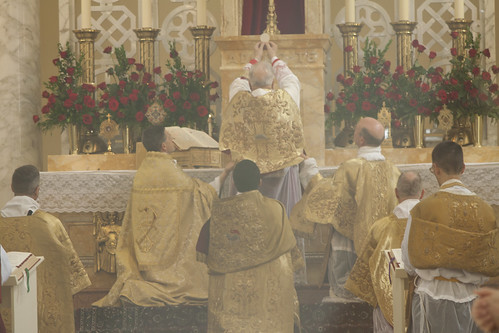
This last reference to the study of the Fathers of the Church refers back not only to Optatem totius (which is the source of the quote about biblical studies), but also to an Instruction on the subject, Inspectis dierum, which came out just three years before Pope John Paul's Exhortation. This, like Optatem totius, makes it clear that it is going to involve a knowledge of Latin.
Inspectis dierum (1989) 'The study of Patrology and of Patristics, which in its initial stage consists in outlining [the subject-matter], demands that manuals and other bibliographical resources be employed. When one arrives at difficult and involved questions of Patristic theology, however, none of these aids suffices: one has to go directly to the Fathers' very texts.'
'Given the well-known deficiencies in the humanities in today’s schools, everything possible will have to be done to strengthen the study of Greek and Latin in centers of priestly formation.'
Inspectis dierum is so interesting and important that, despite having blogged about it before, I am going to blog about it again. I have also had this document re-typed, so it can be more easily be read and searched. It is now available on the Latin Mass Society's website here (word .doc format; pdf format here).
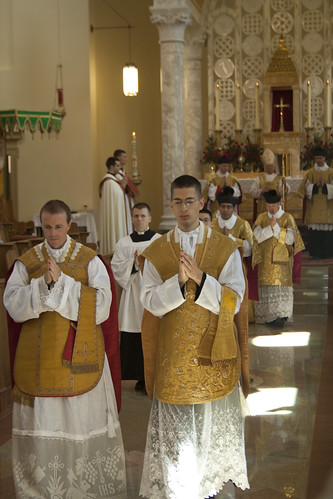 Photos: ordinations to the priesthood in the Seminary of the Fraternity of St Peter in Denton, Nebraska, USA, peformed by Bishop Fabian Bruskewitz, Saturday 21st May 2011. More here.
Photos: ordinations to the priesthood in the Seminary of the Fraternity of St Peter in Denton, Nebraska, USA, peformed by Bishop Fabian Bruskewitz, Saturday 21st May 2011. More here.
 Photos: ordinations to the priesthood in the Seminary of the Fraternity of St Peter in Denton, Nebraska, USA, peformed by Bishop Fabian Bruskewitz, Saturday 21st May 2011. More here.
Photos: ordinations to the priesthood in the Seminary of the Fraternity of St Peter in Denton, Nebraska, USA, peformed by Bishop Fabian Bruskewitz, Saturday 21st May 2011. More here.
Thank you for this post! (I would suggest linking to the very interesting Inspectis Dierum as a PDF rather than a .docx and, perhaps, warning folks that it's a desktop download rather than something that will open in a new window. I was clicking on it, but then not understanding why I wasn't seeing it in my browser!)
ReplyDeleteGood idea - I'll give them the option anyway.
DeleteDone.
ReplyDeleteOPTATAM Totius - Latin, Latin, Latin! ''optatem'' is not a word. Quater!
ReplyDelete